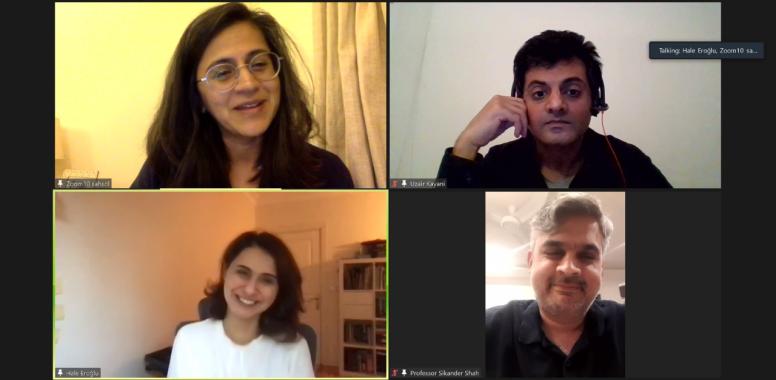
On Tuesday, 15th February 2022, the Centre for Chinese Legal Studies (CCLS) hosted a virtual presentation by Dr. Z. Hale Eroglu titled Rectifying the Name: Sinophone Muslims and Identity Formation in Republican China. Professors Uzair Kayani, Head of the Department at Shaikh Ahmad Hassan School of Law (SAHSOL) and Sikander A. Shah (Director CCLS), moderated the session while attendees included Dr. Sadaf Aziz (Dean of SAHSOL) and Eeman S. Qureshi (Assistant Manager, CCLS) as well as several students, staff, and scholars from other institutions.
Dr. Eroglu’s presentation centred on the Sinophone i.e., Chinese-speaking Muslims during China’s Republican Period of the early to middle twentieth century. Specifically, her central theme was to outline this community’s unique struggle to achieve agency over the evolution of their collective identity. Dr. Eroglu opened her lecture by highlighting the significance of words: any title or label applied to a group of people reflects the ideology of those applying that term and this applies fully to terms like Hui, which was used to denote those who practiced Islam during the imperial period. Later, in 1950s, the Communist Party of China decided to use the term, only to refer to Sinophone Muslims, thus creating an ethnic identity for this community. Dr. Eroglu demonstrated how this official categorization cannot be taken as a top-down imposition by the state, but it was a product of the earlier struggle of Chinese Muslim intellectuals to create an autonomous space for China’s Muslims within Chinese nation-state.
The participants were fascinated to hear some of the Sinophone Muslims’ collective historical narratives, which include ancestry from Arabia, Persia and India, lands where Muslims created or shaped large and influential civilizations. Interestingly there is also a popular belief about a great ancestor of the community, Sa’d ibn abi Waqqas, a very prominent early Muslim, a relative of Prophet Muhammad.
The audience also learned that there was a debate among Chinese Muslim intellectuals with respect to their identity. While some intellectuals argued that China’s Muslims should be categorized as a separate ethnic group, others argued against them and claimed that Sinophone Muslims were a religious community with distinct beliefs and customs within the Han ethnolinguistic group. For this group, foregoing their Han identity would weaken Chinese solidarity and even territorial integrity at a time of European and Japanese imperialism. Huang Zhenpan, an anti-Manchu activist, was particularly notable for his vigorous promotion of the view that Sinophone Muslims were not a distinct ethnic group separate from the Han, yet he strongly resisted the homogenising tendencies of Han nationalists. For the advocates of ethnicity for China’s Muslims, however, creating an ethnic identity for Muslims would allow them to have specific rights and privileges in a secular state.
The Q&A session moderated by Ms. Qureshi, included discussion of intellectual appropriation and distinct community status of the Sinophone Muslims. In response to a question, Dr. Eroglu provided a detailed account of how the intellectual appropriation process unfolded: Sufi thoughts and values came from the movement of persons from India, Persia, and Central Asia while new technologies such as steamships accelerated the transmission of new ideas from different Muslim centres of thought and learning in the twentieth century.
Following the Q&A, Professor Shah, Dean Aziz, thanked Dr. Eroglu, who very generously shared her contact information in case the attendees wanted to ask further questions.








